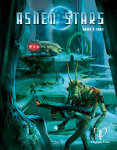Robin D. Laws's Blog, page 95
October 18, 2011
Link Round-Up: Dracula Notes, Sendak Quote, Lennon Tooth
 Stoker great-grandson finds Dracula notebook in Isle of Wight attic.
Stoker great-grandson finds Dracula notebook in Isle of Wight attic.
"I refuse to cater to the bullshit of innocence." — Maurice Sendak provides the quote of the day.
Reliquary not included: John Lennon tooth carries £10,000 auction estimate.
The Arsenic Eaters
 As with other GUMSHOE games like The Esoterrorists and Mutant City Blues, Ashen Stars GMs are encouraged to look to the news for episode inspiration. Like the writers of the various Treks and the nouveau Battlestar, they might use the space opera form to examine issues of the day.
As with other GUMSHOE games like The Esoterrorists and Mutant City Blues, Ashen Stars GMs are encouraged to look to the news for episode inspiration. Like the writers of the various Treks and the nouveau Battlestar, they might use the space opera form to examine issues of the day.
Alternately, they can start with pop science articles and either work their way to political allegory, or not, as desired.
For example, a recent study indicates that drug addiction piggybacks on the same neural impulses that lead animals to crave salt.
In the episode this inspires, the crew is hired to investigate a series of attacks on Combine ships near the Bleed's far edge. They discover that the hostile party is a heretofore unknown advanced species called the gretherin. Although at first they seem merely xenophobic and implacably hostile, a twist reveals their motivations. A gang of human and cybe drug runners has infiltrated their home world, engineering a synthetic drug by hijacking the gretherin's necessary craving for arsenic, a trace metal they require to regulate metabolic function. The gangsters aim to addict the entire planet to a substance only they can manufacture, draining it of its wealth. The gretherin take this for an act of war waged by the entire Combine. Can the PCs avert a nasty local conflict by taking down the drug gang and destroying the technology used to create the drug?
October 17, 2011
Link Round-Up: Hasbro Financials, Goodbye to Celluloid, Owning History
 Hasbro struggles to meet Wall Street expectations despite soaring licensing revenues.
Hasbro struggles to meet Wall Street expectations despite soaring licensing revenues.
Major manufacturers have ceased production of celluloid film cameras.
Emma Thompson film lodges pre-emptive lawsuits against rival claimants to historical story.
The Birds: Colloquialisms
October 14, 2011
A Look Back at Korad: II: The World
 Last week I talked about the process behind Korad. Now let's examine the content.
Last week I talked about the process behind Korad. Now let's examine the content.
The risk with any creative collaboration between a large group is of a plunge into the mushy middle. If the hallmark of superlative work is individual vision, crowd-sourced creation threatens to settle on bland consensus.
Yet Korad is anything but bland. It sidesteps trad fantasy tropes: for example, by choosing as its major inhuman races discorporate "body snatchers" and a refreshingly sympathetic take on the ghoul motif. Though its general vibe is more ancient than medieval, it eschews the influence of any one identifiable earth culture. Koradi culture has the depth and internal contradictions of any historical empire, without owing too much to any one of them.
It's certainly not a world I would have come up with on its own. The unpredictability of its creation lends it the lived-in feel, the paradoxes that lend it believability.
In any vote-based project, a pattern soon makes itself apparent. Decisions tend to fall on a sweet spot in an emergent spectrum. Where a particularly brilliant or engaging choice comes up, the vote result may fall outside the sweet spot, serving as a distinguishing exception.
For example, in the old Angels and Operators play-by-blog game, the continuum was between caution and heedlessness. Instructions for our delusional-or-is-he protagonist showed a marked preference for seeking more information over other choices. Because this was so clear and obvious a choice, I learned to write the choices to take it out of consideration. After that, voters arrived at a collective compromise between risk and inaction.
Here the ends of the continuum were the practical and the whimsical. Votes generally clustered at a compromise point between these two extremes. Anything too prosaic lost out, as did the most far-out or absurd choices. The many-headed voter preferred a fantastical world anchored in an accessible logic. But not too logical—collective wisdom wanted their magic stones fungible and poetic, rather than basing them a rigorous extrapolation.
A secondary tension arose for Koradi culture. The brief was to create a strong-seeming empire with a glass jaw, one on the verge of a centuries-long ideological collapse. Ultimately the group chose to make Koradi culture largely unsympathetic to a modern audience, in its austerity and opposition to frivolity. Yet a strong faction worked to make the crumbling empire somewhere their fictional protagonists and player characters would like to live.
Although a changing blogscape promises diminishing returns for a continuing Korad experiment, we made a pretty cool world along the way. If you contributed ideas or voted on those of others, now's the time to give yourself a pat on the back. Or perhaps toast yourself with a fine Winecoast vintage.
October 13, 2011
Hillfolk Synopses
 For a look at sort of broad-strokes narrative that might emerge over longterm DramaSystem play, I thought I'd provide you with the following synopses. These cover the first distinct chunk of episodes, analogous to a season of a serialized drama.
For a look at sort of broad-strokes narrative that might emerge over longterm DramaSystem play, I thought I'd provide you with the following synopses. These cover the first distinct chunk of episodes, analogous to a season of a serialized drama.
The system doesn't impose a particular arc on the group; rather, it provides a framework allowing the group to improvise its own storyline.
In retrospect we can see a pretty clear arc, though: after we establish our clan of iron age raiders and its immediate neighbors, they come into contact with the richer, more sophisticated nation to the north. They start out fighting it, and wind up joining it.
These synopses leave out a lot of the individual character arcs in each episode. Considered together, though, you can see the season arcs for the various PCs.
At the beginning of each episode, one player calls the first scene, and specifies its theme. The episode titles originate in these themes.
Hunger
When a harsh winter threatens the Horsehead clan with starvation, the clan chieftain, Skull, seeks a solution aided by other prominent Horsesheads (the shaman Roll-the-Bones, the mighty warrior Redaxe, the shepherd Thickneck and the hostler Twig).
Outsiders
The Horseheads learn the price of success when their raid against the neighboring Lavender clan wipes out their entire male fighting force, leaving them vulnerable and the Horseheads responsible for their protection. Skull faces a challenge from the intemperate warrior Treeclimber, who demands too great a share of the loot. Horsehead leaders solve two problems at once by arranging for Treeclimber's daughter to marry Farhawk, adolescent son of the slain Lavender chieftain.
The Injustice of Randomness
Disease strikes the village, sending Skull to his sickbed. Members of a recently absorbed clan, the Greensnakes, seize on his weakness in an attempt to kill him and seize power. Skull demands the expulsion of the Greensnakes, but, in a move vehemently opposed by Roll-the-Bones, wishes to keep their three most attractive women as concubines. Skull wins the debate, alienating the wise woman, only to see the women struck dead by lightning.
Redemption
A trip to Lavender reveals that the neighboring clan has fallen into violently opposed camps. After much contention, and the reluctant subordination of the Lavender firebrand Farhawk to Skull, the Horsehead leaders absorb the Lavenders into their ranks, to the apparent approval of the spirit world.
October 12, 2011
October 11, 2011
The Birds: Horrible
October 7, 2011
Link Round-Up: Ashen Availability, Fringe History, Sun Surrender, Ferry Wine
 If you've been waiting for Ashen Stars to show up for sale at RPGNow or Flames Rising, wait no longer.
If you've been waiting for Ashen Stars to show up for sale at RPGNow or Flames Rising, wait no longer.
Nick Mamatas examines the historical provenance of Fringe's Walter Bishop(s.) (Link good for one week only.)
The Toronto Sun is just phoning it in now.
If I learned that Bryan Ferry could drink wines with ugly labels, my faith in humanity would have been shattered.
A Look Back at Korad I: The Process
 Since June 2010 this blog has hosted the Korad experiment, an exercise in group world-building. The final fact we learned about Korad concerns its nominal future. We selected the three candidates for a future ideology which will one day supersede the empire's dominant worldview. As determined by you, they are:
Since June 2010 this blog has hosted the Korad experiment, an exercise in group world-building. The final fact we learned about Korad concerns its nominal future. We selected the three candidates for a future ideology which will one day supersede the empire's dominant worldview. As determined by you, they are: Candlism, a stoic blend of religion and philosophy.
Satirism: a working-class magical movement subverting official opposition to frivolity
Symbotomism: a movement determined to eradicate Aesigil influence, at the cost of also destroying written language
My original intention was to use the world creation as a prelude to another play-by-blog exercise, along the lines of Angels and Operators. As you may guess from the opening clause of the previous sentence, I've reconsidered and will no longer be going ahead with that.
It used to be that an ongoing feature, like Korad or Angels and Operators, offered me an acceptable trade-off on the time versus inspiration scale. They took more time to write than the average blog post, but they reliably provided a guaranteed topic for one slot a week. The Hamlet analysis proved even more fruitful, leading as it did to a gratifyingly successful book, Hamlet's Hit Points, and acting as inspiration for my upcoming new game engine, DramaSystem.
Even more so than a year ago, a blog designed to attract an audience thrives on one-time clicks from social media platforms. Ongoing features did well back when LiveJournal was still a growing concern, and users reloaded their friends page on a habitual basis. Readership for LJ has been slowly deflating over the past year, in part prompting my exodus to the new blog. In the social-click driven environment, which I can now measure with a reasonable degree of accuracy, repeat features lose attention after a while. Those with a play-by-blog format suffer doubly, from what might be called the Babylon 5 effect. They require a high degree of investment and are hard to catch up with if you don't jump on board from the outset. Given the challenges of LJ's decline and timing of the move to the new blog, we still had great participation on the world-building end. However, in the new environment or paradigm or whatever it is, I don't see a play-by-blog series as the best use of my limited outreach time in future.
What I was going to do was have commenters play, to whatever extent they wanted, influential members of the chosen ideology. I'm betting the collective would have chosen Satirism, with few participants rooting to play either stoics or destroyers of literacy. Each play session would present a turning point, where the group would have to decide how to handle a crisis affecting the movement from within and without. Each turn would jump forward in time, allowing for multi-generational play as the ideology adapted itself to changing historical circumstances.
If I had the time to do this, which I'm sure I don't, I might attempt to do the play over on Google+. It's new and shiny; its circle feature and discussion orientation might prove more amenable to play-by-blog than a standard comments arrangement.
I'll do one more blog post, looking at what we've learned about world-building from this collective process. In the meantime, though, it's time to throw Korad's fate open to you. My final version of the resulting world bible, has now been uploaded to Scribd. The document and its underlying intellectual property are, as always, public domain. You are free to do what you want with it. Peruse it. Change it. Use it as a setting for fiction, your home game, or a published RPG. If you do choose to do something with it, be sure to check in with a report.






